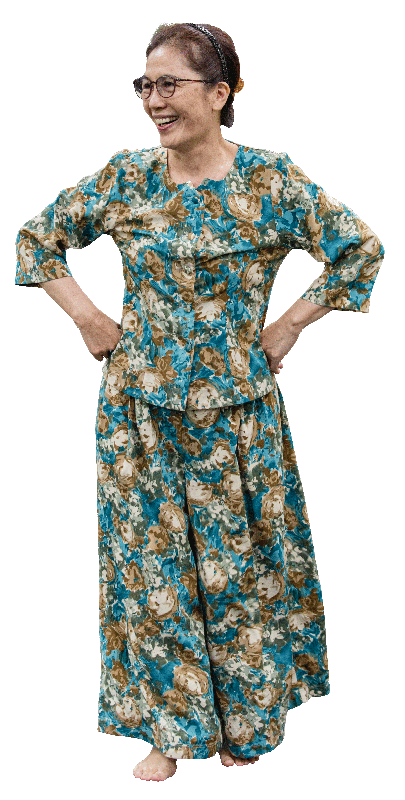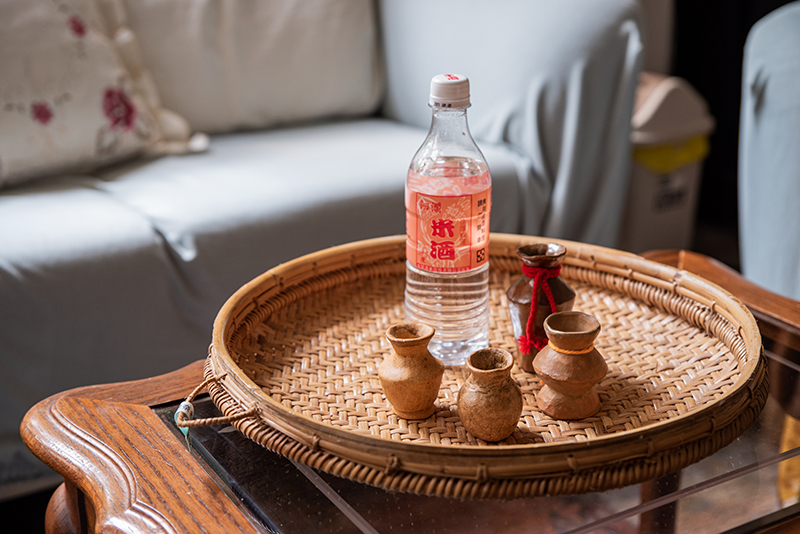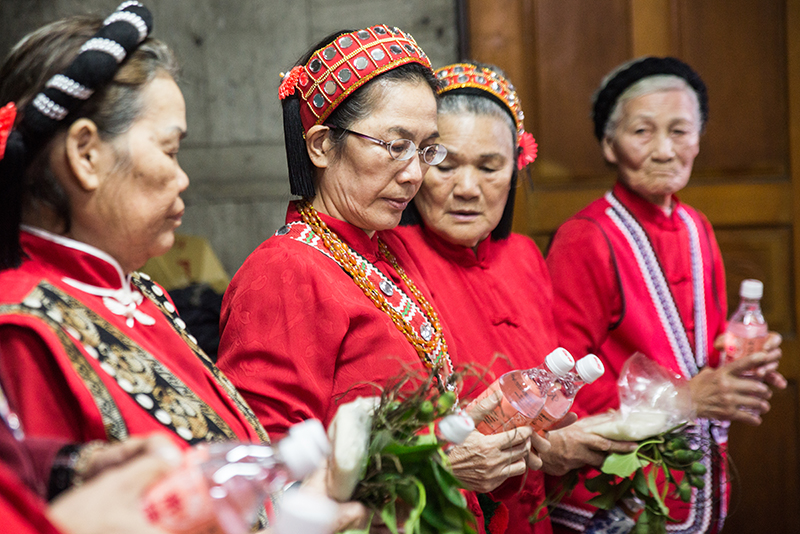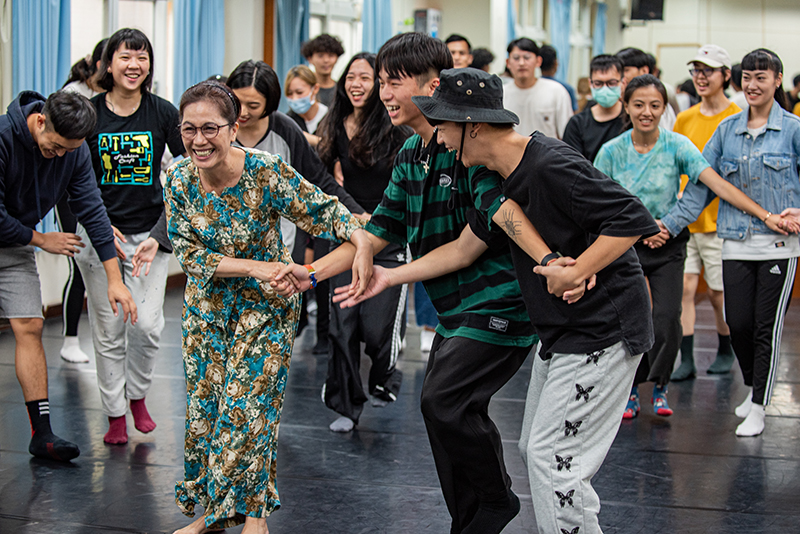

“We finally know that as women, we are fully capable of serving different roles in the worlds of spirituality and mundanity. That feels really great!”
Growing up in a time when discrimination was directed against indigenous peoples, Panay Mulu used to be a Pangcah who refused to speak her mother tongue and struggled to deny her identity. Yet 30 years of field research into Taiwan’s indigenous music and dance has changed her mindset, motiving her to embrace her mother culture and in turn learn from community shamans to look at things from a spiritual perspective.
On an Autumn day, the cheerful sound of music and dancing is heard on the campus of National Dong Hwa University. Standing in the middle of the classroom is Panay Mulu, who is leading her students to explore Taiwan’s indigenous music and dance culture. She is currently an associate professor at the Department of Ethnic Relations and Cultures, but also an ethnomusicologist who has conducted fieldwork in Hualien for nearly 30 years. Five years ago, she even went from being an observing researcher to becoming a member of Sikawasay, the shaman group from Hualien’s Lidaw Community.
“In the past, few people were happy to admit that they were indigenous,” recalls Panay, who is now 60. As she remembers, when she was young, indigenous people were often referred to as “barbarians” or “mountain people.” She has also heard classmates being admonished by their parents “not to mingle with indigenous kids.” Whenever children made a mistake, it was indigenous ones who were often punished most severely. “The discrimination in the eyes of Non-indigenous people hurt us badly like a sharp sword.” says Panay. Therefore, she was determined at a young age to study hard and became superior to others so that she would never be looked down upon.
In her third year of primary school, Panay’s father bought her a piano, which was the first one in the community. That’s how she entered the world of music. After senior high school, she went on to major in music at National Taiwan Normal University, and it was there that she met her mentor, Hsu Tsang-houei, who has changed her life.

Who am I?
The Mystery of an Unsettled Heart
Upon hearing Hsu’s name, Panay sits up straight and exclaims that the deceased Professor Hsu is indeed a great teacher worthy of respect.
Dubbed as the “Promoter of Taiwanese Folk Music,” Hsu launched the Folk Song Collected Movement in the 1960s. He often referred to Panay as “Princess of Pangcah” and extolled indigenous music as Taiwan’s beautiful treasure. Such comments were a shock to Panay, who had chosen to study Western music, and in turn led her to generate a sense of contradiction about her identity.
Once Panay went with Hsu to the Kiwit community for field study. She had thought she knew the Pangcah language well, but it turned out that she couldn’t understand what the elders were saying at all. “I was really frustrated,” admits Panay, “wondering who the hell am I? How come I come to know nothing about my mother tongue?”
Having finished her study in Taipei, Panay couldn’t wait to move away from the life difficult for her to adapt to. She decided to return to Hualien without hesitation, where she would find a teaching job in middle school. Yet even with her high academic achievement and stable job there, Panay still felt unsettled. “It’s like living in mainstream society with a fake Non-indigenous identity, which makes me feel so distant from the world that I belong to.”

Getting Connected with Ancestral Spirits
Upon Receiving an Indigenous Name
It was not until one summer vacation when Hsu asked Panay if she knew that in the Fakong Community, the Pangcah people there would stay up all night on the first day of their Ilisin, did Panay came to a turning point that would forever change her life. Driven by an intense curiosity about such a practice she’d never heard of, she rode her scooter straight into the mountains, heading toward the community. Along the dark path were numerous graves, and streetlamps were scarce. She began to regret being so impetuous, but there was no way back. In the end, it took her more than 3 hours to reach her destination.
During the ritual that lasted all night, Panay hid in the crowd and documented the event with a camera and tape recorder like a researcher. However, as there were no other females present on the spot, eventually she was recognized and brought to the front of the community elder, with three bowls of rice wine placed at her feet.
When asked by the elder about her name, Panay gave three different ones in Mandarin Chinese, Taiwanese, and Japanese, respectively. But the elder responded sullenly, “Tell me your Pangcah name, otherwise I can’t converse with you at the ritual.” Then, she was given the name of “Panay” and then asked to consume the rice wine. Having not drank a drop of water that night, Panay felt relaxed all over imbibing the liquor. When she finished the last bowl, for some unknown reason, she fell on her knees and broke down crying. “Now, according to my interpretation as a shaman, such reaction shows that my spirit has finally become connected with those of our ancestors,” explains Panay.
It is from then that Panay becomes fascinated with her mother culture and begins to document the traditional music and dance by participating in the rituals of different Pangcah communities. One time on her way to the beach, she heard a faint singing voice coming from nowhere. That was a poignant song she’d never heard before. “I felt the urge to cry and thought that was the true melody of the Pangcah.” The sound of the chorus led her to the Lidaw Community, where she discovered the singers to be their shaman group, Sikawasay.
Afterward, with an intense interest in the Pangcah music and dancing, Panay quits her job at the age of 30 and throws herself instead into field research on indigenous culture. “What I used to neglect and deemed insignificant in the past has now become rich in meaning.” Take, for example, the often-heard sounds of “oi ha hai” in ritualistic songs. They are generally considered to be meaningless fillers, while Panay has always tried to refute it but cannot find convincing proof. Now she finally finds the answer after becoming a member of Sikawasay. “That phrase means ‘Come, Spirits. Here I am!’ It is a language at the level of spiritual interaction that rhymes with the songs but is not yet transformed,” explains Panay. “That’s why I’m proud to be Pangcah,” she continues, “because I am embracing the quintessential goodness, beauty, and truth of my culture.”

The Quest for Spiritual Harmony
and Completeness with Others
Transitioning from scholar to shaman enables Panay to settle her soul, which used to find no place to turn to, and also allows her to look at things from a spiritual perspective. Panay used to hate cooking until she was admonished by her grandmother that the kitchen is where women guard the lives of their families and where ancestral spirits enter the house. A kitchen without cooking smoke means the home is not breathing, and therefore dead. One must have smoke coming out from her kitchen so that God will protect the household and ancestral spirits know where the descendants are. “Even if it’s just to make a bowl of wild vegetable soup, you’ve got to keep the kitchen warm.”
When it comes to healing rituals, the Pangcah people believe that in the spiritual world, each of the five major sections of the human body is looked after by different spirits. When people sing and dance, they are resonating with all these guarding spirits taking care of their health, thus generating a natural sense of relaxation for the body, mind, and spirit. “That’s why indigenous people become so cheerful when they are singing and dancing, but outsiders simply do not know why they’re doing so,” Panay explains.
Having played up multiple roles of a wife, mother, daughter, shaman, and teacher, Panay never imposes a frame on herself and is always transitioning freely between these roles. “From a spiritual point of view, the gender of one’s body is transient. Rather, it is the soul that will remain eternal.” She adds that there is an important word in Pangcah, “sakelemt,” meaning “mutual completeness” in terms of spirituality.” What she seeks is a spiritual balance and harmony with people around her, including her husband, children, and students. That is, they complete each other’s life.
In the Pangcah society, only three kinds of social roles can serve to sing poetry: shamans, community leaders, and women. It follows that females in matriarchal societies are not only in charge of mundane affairs but also serve as members of the spiritual world. “This is indeed the most challenging and enjoyable part of being a Pangcah woman,” says Panay laughingly. “We finally know that as women, we are fully capable of serving different roles in the realms of spirituality and mundanity. I would not resist challenges that any of these roles gives me, but rather I really enjoy the process of going through them.”
For Panay, inhabiting different roles as a woman is never a hindrance for her advancement. Rather, it is the strength that comes from the depth of her soul that allows her to live the best of her life.




